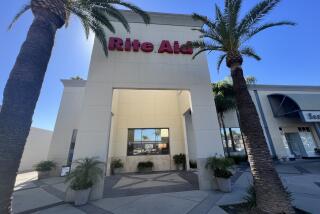Red Cross Is Laying Off 80; Will Collect Less Blood : Health: It has received thousands of units each month that it is unable to sell. Competition with a private blood brokerage is blamed.
The competitive marketplace struck a new target Thursday when the American Red Cross laid off 80 of its 650 blood-collection employees in Los Angeles and Orange counties, saying that it was being undercut by a private blood brokerage company.
Since early this year, the Red Cross said, it has been collecting thousands of units of blood each month that it is unable to sell. Often this blood must be destroyed because of federal restrictions that say blood may not be used after it has been on the shelf more than 42 days.
The layoffs are part of a reduction plan that will result in the collection of only about 270,000 units of blood during the coming fiscal year, compared to 370,000 units collected during the fiscal year that ended in June, according to Dr. Steven Kleinman, blood services medical director for the two-county region.
“We have an obligation to patients to operate as cost-effectively as we can,” Kleinman said.
The Red Cross had problems finding enough blood donors in the mid-1980s because of publicity about AIDS and reports of transfusion-related infections, which largely ended in 1985 when an antibody screening test was introduced.
The problem now, Kleinman said, is not a shortage but competition and new medical trends.
Among these, he said, is the tendency of doctors to be more conservative about using transfusions because of patients’ fears; the use of a new hormone that can in some cases remove the need for transfusions by speeding the manufacture of blood cells, and the decision of many people to donate their own blood, or use the blood of relatives, before surgery.
Perhaps the biggest factor leading to the Red Cross’ surplus of blood, Kleinman said, is a 1-year-old company in West Los Angeles, American Blood Institute, that buys surplus blood from an Oklahoma blood bank and resells it to hospitals in Southern California.
Because labor costs are lower in Oklahoma and because less effort is needed to encourage donations, the brokerage company is able to buy blood at a savings, he said.
ABI buys its blood from the nonprofit Oklahoma Blood Institute. According to a 1989 Philadelphia Inquirer report, the Oklahoma organization that year was selling 300 units of blood and blood products a week to ABI at $58 a unit. ABI marked up the price to between $67 and $69 a unit and sold it to Los Angeles hospitals, the Inquirer said.
The Red Cross says it now sells blood in Los Angeles for $82.50. It and other sources estimate that ABI now sells blood here for about $75.
The president of ABI, Joseph J. Stone, was out of town Thursday and his company declined to comment, a spokeswoman said.
A spokeswoman for the American Assn. of Blood Banks, which represents hundreds of nonprofit organizations, said her organization is aware of the relationship between ABI and the Oklahoma City blood bank. She described it as “a very unusual situation.”
In addition to selling blood to hospitals, ABI is one of a small number of firms that offer personal blood-storage facilities, offering to freeze a person’s blood and then rush it anywhere in the United States if he or she needs an emergency operation. One such company has even opened an account with Federal Express Corp.
About 14 million units of blood are collected throughout the country each year. It is sold to hospitals at prices ranging from $50 to $100 a unit. In Los Angeles, teeming with a variety of languages and sprawling suburbs, the Red Cross’ cost of running donation centers and promoting blood drives is substantial, Kleinman said.
Kleinman said that while the Red Cross has not been experiencing blood shortages, the Christmas holiday season is traditionally a time in which short-term shortages crop up as donations fall.
More to Read
Inside the business of entertainment
The Wide Shot brings you news, analysis and insights on everything from streaming wars to production — and what it all means for the future.
You may occasionally receive promotional content from the Los Angeles Times.










